Research Labs
 > Research > Research Labs
> Research > Research Labs
- Seismology and Geophysics Laboratory Homepage s236호|(02) 2123-7674
-
 Seismology and Geophysics Lab studies on various physical phenomena that include physical properties of solid earth, seismic source properties, earthquake induction mechanism, earth structures, and tectonic evolution.
Seismology and Geophysics Lab studies on various physical phenomena that include physical properties of solid earth, seismic source properties, earthquake induction mechanism, earth structures, and tectonic evolution.
- Hydrogeology Laboratory Homepage s205호|(02) 2123-7267
-
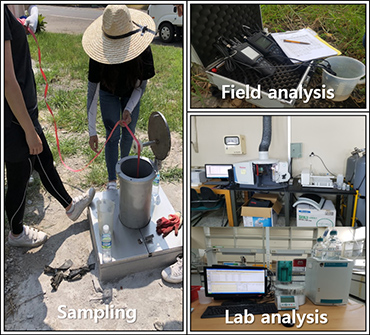 Yonsei Groundwater Lab (YGL) has research interests on the following subjects:
Yonsei Groundwater Lab (YGL) has research interests on the following subjects:
· Sustainability of groundwater resources and its assessment
· Studies on the physico-chemical changes of groundwater corresponding
to the changes of natural and anthropogenic drivers
· Groundwater monitoring technologies for Earthquake surveillance and
prediction
- Remote Sensing Laboratory Homepage s203호|(02) 2123-7265
-
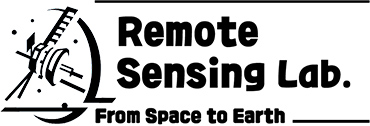 Remote sensing laboratory conducts research about detecting and identifying surface and subsurface changes using satellite images. Mainly we conduct research about measuring displacement of surface deformation, ground moving target indication(GMTI), estimating surface temperature, and estimating surface reflectance using satellite synthetic aperture radar(SAR), electro-optical and infrared (EO/IR) data.
Remote sensing laboratory conducts research about detecting and identifying surface and subsurface changes using satellite images. Mainly we conduct research about measuring displacement of surface deformation, ground moving target indication(GMTI), estimating surface temperature, and estimating surface reflectance using satellite synthetic aperture radar(SAR), electro-optical and infrared (EO/IR) data.
- Mineralogy lab Homepage s327호|(02) 2123-7241
-
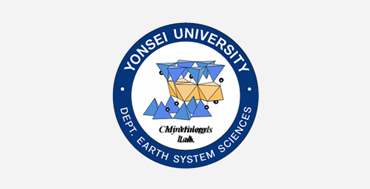 Mineralogy lab researches on the earth minerals to better understand the specific geological environments to form specific mineral, to alter it to another, and to destroy it through the crystallographic and chemical characterization of minerals. Our current research topics are time-determination of fault activation/reactivation using IAA (illite-age analysis), and integrated approach using both mineralogical/geochemical analysis and molecular orbital simulation for silicate clays and zoning minerals.
Mineralogy lab researches on the earth minerals to better understand the specific geological environments to form specific mineral, to alter it to another, and to destroy it through the crystallographic and chemical characterization of minerals. Our current research topics are time-determination of fault activation/reactivation using IAA (illite-age analysis), and integrated approach using both mineralogical/geochemical analysis and molecular orbital simulation for silicate clays and zoning minerals.
- Environmental Geochemistry Laboratory Homepage s215B호|(02) 2123-4629
-
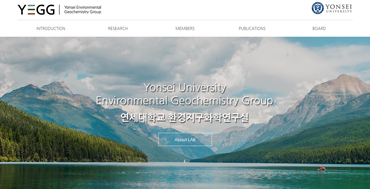 The main research interest at Yonsei Environmental Geochemistry Group (Y-EGG) is to understand the fate and transport of various elements that are crucial to human and the Earth’s ecosystem. We examine the diverse chemical reactions between the elements and/or the primary solid phases under aqueous conditions analogous to a wide range of natural or engineered systems. Laboratory experiments complemented by the state-of-the-art analytical techniques enable us to disentangle the complex geochemical processes and provide the basic information of the natural processes for continuing Earth’s sustainability.
The main research interest at Yonsei Environmental Geochemistry Group (Y-EGG) is to understand the fate and transport of various elements that are crucial to human and the Earth’s ecosystem. We examine the diverse chemical reactions between the elements and/or the primary solid phases under aqueous conditions analogous to a wide range of natural or engineered systems. Laboratory experiments complemented by the state-of-the-art analytical techniques enable us to disentangle the complex geochemical processes and provide the basic information of the natural processes for continuing Earth’s sustainability.
- Structural Geology and Tectonics Laboratory Homepage s230호|(02) 2123-7658
-
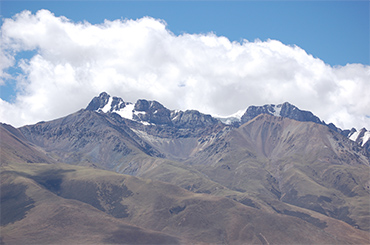 Structural geology is the study of the architecture of rocks from micro- to macro scales resulting from deformation. Tectonics is same as Structural Geology but with very large scale. Research aspects of structural geology can be classified into structural geometry, kinematics and mechanics. Undergraduate level structural geology course cover most of the structural geometry and parts of the kinematics and mechanics. Most of the kinematics and mechanics will be covered as graduate level courses.
Structural geology is the study of the architecture of rocks from micro- to macro scales resulting from deformation. Tectonics is same as Structural Geology but with very large scale. Research aspects of structural geology can be classified into structural geometry, kinematics and mechanics. Undergraduate level structural geology course cover most of the structural geometry and parts of the kinematics and mechanics. Most of the kinematics and mechanics will be covered as graduate level courses.
- Crystallography Laboratory Homepage s202호|(02) 2123-4628
-
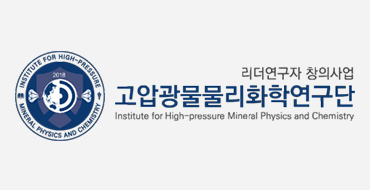 We study minerals and materials under high-pressure and temperature conditions to understand our planet and to discover novel properties of materials. We develop and use advanced instrumentations such as resistive- and laser-heated diamond-anvil cells in combination with advanced light sources such as synchrotron and X-ray free electron laser facilities.
We study minerals and materials under high-pressure and temperature conditions to understand our planet and to discover novel properties of materials. We develop and use advanced instrumentations such as resistive- and laser-heated diamond-anvil cells in combination with advanced light sources such as synchrotron and X-ray free electron laser facilities.
- Biogeochemistry Lab Homepage s226호|(02) 2123-7268
-
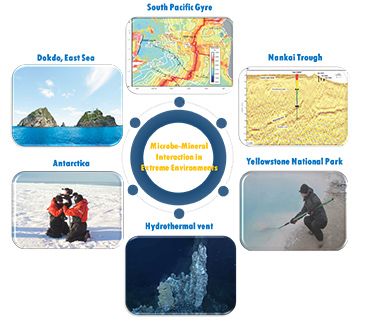 Recent Interests in the Biogeochemistry Lab, Yonsei University, Seoul, Korea are: 1) microbe-mineral interaction in extreme environments; 2) biomineralization; and 3) biogeochemical process & mechanism, based on the field investigations including the Antarctica, South Pacific Gyre, Yellowstone Hot spring, Deep-sea hydrothermal vent, Nankai Trough, and Dokdo East Sea. Our field research is closely linked to the K-IODP (Korea International Ocean Discovery Program), KIOST (Korea Institute of Ocean Science and Technology) and KOPRI (Korea Polar Research Institute) explorations, previously participated in Exp.370, Exp.329, Exp.348, CIR18, HO-18-08, Cr1041, ANA08D, Cr1501, NFB1602, CIR1702, ANA13, and continuously plan to investigation in the extreme areas on the Earth. Our ultimate goal is to investigate the “Geological Factors” that may control the limit of biosphere” and the “origin of life”, the fundamental question of mankind.
Recent Interests in the Biogeochemistry Lab, Yonsei University, Seoul, Korea are: 1) microbe-mineral interaction in extreme environments; 2) biomineralization; and 3) biogeochemical process & mechanism, based on the field investigations including the Antarctica, South Pacific Gyre, Yellowstone Hot spring, Deep-sea hydrothermal vent, Nankai Trough, and Dokdo East Sea. Our field research is closely linked to the K-IODP (Korea International Ocean Discovery Program), KIOST (Korea Institute of Ocean Science and Technology) and KOPRI (Korea Polar Research Institute) explorations, previously participated in Exp.370, Exp.329, Exp.348, CIR18, HO-18-08, Cr1041, ANA08D, Cr1501, NFB1602, CIR1702, ANA13, and continuously plan to investigation in the extreme areas on the Earth. Our ultimate goal is to investigate the “Geological Factors” that may control the limit of biosphere” and the “origin of life”, the fundamental question of mankind.
- Geologic Fluid Dynamics and Geofluids Laboratory Homepage s204호|(02) 2123-7266
-
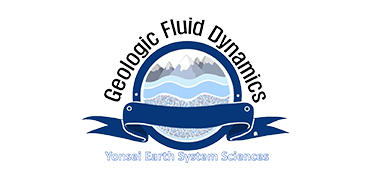 Geologic fluids group focuses on environmental, climate change, and energy related research such as geologic CO2 sequestration, geysers dynamics, density-dependent flow, fault hydrogeology, and geothermal energy development with an emphasis in multi-phase phenomena, reactive transport modeling, and heat transport. Thus, research includes interdisciplinary approaches, integrating elements of fluid transport in porous media, hydrogeochemistry, geology, thermodynamics, and petroleum engineering.
Geologic fluids group focuses on environmental, climate change, and energy related research such as geologic CO2 sequestration, geysers dynamics, density-dependent flow, fault hydrogeology, and geothermal energy development with an emphasis in multi-phase phenomena, reactive transport modeling, and heat transport. Thus, research includes interdisciplinary approaches, integrating elements of fluid transport in porous media, hydrogeochemistry, geology, thermodynamics, and petroleum engineering.
- Geodynamics Laboratory Homepage s205호|(02) 2123-7267
-
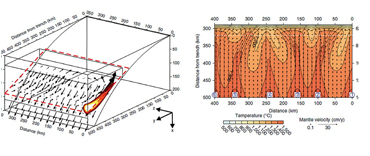 Geodynamics group focuses on temporal and spatial evolution of subduction zone and its implication for tectonics. For example, slab buckling, plume-slab interaction and slab melting resulting in adakites have been studied. Ongoing studies include slab dehydration and fluid flow in subduction zone using 2- and 3-D numerical modeling.
Geodynamics group focuses on temporal and spatial evolution of subduction zone and its implication for tectonics. For example, slab buckling, plume-slab interaction and slab melting resulting in adakites have been studied. Ongoing studies include slab dehydration and fluid flow in subduction zone using 2- and 3-D numerical modeling.
- Morphodynamics and Quantitative Stratigraphy Homepage s213호|(02) 2123-2666
-
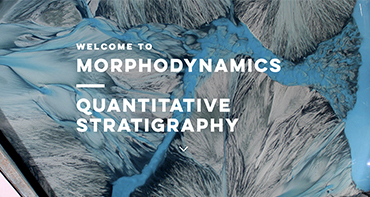 The Morphodynamics and Quantitative Stratigraphy group at the Department of Earth System Sciences, Yonsei University seeks to advance our understanding of stratigraphic responses to sediment transport processes and imposed boundary conditions in depositional basins. The morphodynamics of the sediment-fluid interface is influenced by both depositional mechanics and environmental controls. Subsurface architecture is a record of the "fossilized" dynamics of this moving boundary. The research interest lies in improving tools for predicting subsurface spatial architecture across a range of scales using an understanding of sediment transport and surface flow dynamics and their time-integrated preservation in depositional systems. Our research group conducts laboratory experiments to study sedimentation over space and time scales that are usually inaccessible in the field, and use the experimental data to motivate and constrain theoretical models of morphodynamics and depositional patterns. We apply insight gained from physical and mathematical models to field data in order to improve interpretation of paleoenvironments using the stratigraphic record.
The Morphodynamics and Quantitative Stratigraphy group at the Department of Earth System Sciences, Yonsei University seeks to advance our understanding of stratigraphic responses to sediment transport processes and imposed boundary conditions in depositional basins. The morphodynamics of the sediment-fluid interface is influenced by both depositional mechanics and environmental controls. Subsurface architecture is a record of the "fossilized" dynamics of this moving boundary. The research interest lies in improving tools for predicting subsurface spatial architecture across a range of scales using an understanding of sediment transport and surface flow dynamics and their time-integrated preservation in depositional systems. Our research group conducts laboratory experiments to study sedimentation over space and time scales that are usually inaccessible in the field, and use the experimental data to motivate and constrain theoretical models of morphodynamics and depositional patterns. We apply insight gained from physical and mathematical models to field data in order to improve interpretation of paleoenvironments using the stratigraphic record.
- Satellite Geosciences Laboratory Homepage s203호|(02) 2123-7265
-
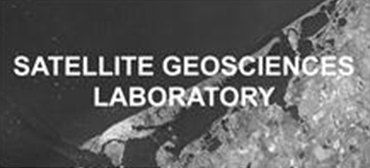 The Satellite Geosciences Laboratory at Yonsei University uses satellite data and remote sensing technology to study the Earth’s natural processes and systems, including the water cycle. Specifically, we are conducting (1)satellite data signal processing and algorithm development, (2)satellite-based water monitoring and land/coastal/marine environment analysis system development, and (3)multi-satellite data and earth system modeling convergence research.
The Satellite Geosciences Laboratory at Yonsei University uses satellite data and remote sensing technology to study the Earth’s natural processes and systems, including the water cycle. Specifically, we are conducting (1)satellite data signal processing and algorithm development, (2)satellite-based water monitoring and land/coastal/marine environment analysis system development, and (3)multi-satellite data and earth system modeling convergence research.
- Geoecology Laboratory Homepage |
-
 Geoecology is an interdisciplinary field of study that combines principles and methods from geology and ecology to investigate the complex interactions and material cycling between living organisms and the physical environment. Geoecologists seek to understand how changes in the Earth’s lithosphere, hydrosphere, and atmosphere affect the biosphere, including the ways in which different types of organisms respond to changing environmental conditions and contribute to ecosystem functioning and material cycling. There are many approaches to studying geoecology, but our research group currently focuses on paleoenvironmental reconstruction studies using paleoecological proxy records and investigating the contribution of wetland ecosystems to the global carbon cycle. Our ongoing goal is to combine data from previously classified geological and ecological fields to derive new observational results and research questions.
Geoecology is an interdisciplinary field of study that combines principles and methods from geology and ecology to investigate the complex interactions and material cycling between living organisms and the physical environment. Geoecologists seek to understand how changes in the Earth’s lithosphere, hydrosphere, and atmosphere affect the biosphere, including the ways in which different types of organisms respond to changing environmental conditions and contribute to ecosystem functioning and material cycling. There are many approaches to studying geoecology, but our research group currently focuses on paleoenvironmental reconstruction studies using paleoecological proxy records and investigating the contribution of wetland ecosystems to the global carbon cycle. Our ongoing goal is to combine data from previously classified geological and ecological fields to derive new observational results and research questions.










